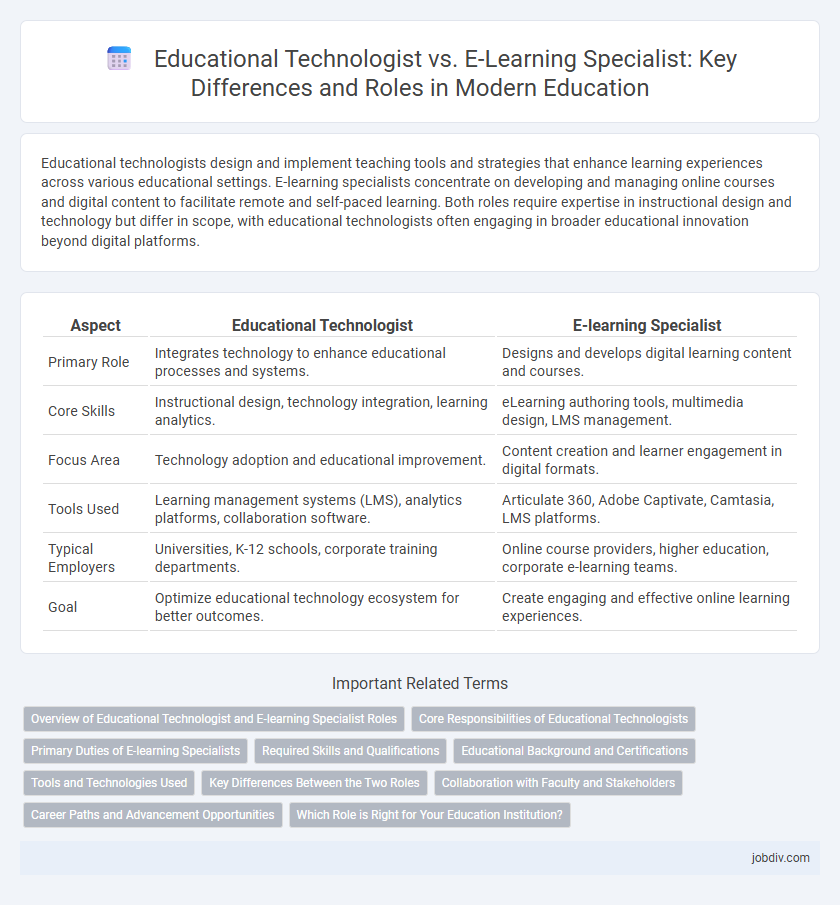Educational technologists design and implement teaching tools and strategies that enhance learning experiences across various educational settings. E-learning specialists concentrate on developing and managing online courses and digital content to facilitate remote and self-paced learning. Both roles require expertise in instructional design and technology but differ in scope, with educational technologists often engaging in broader educational innovation beyond digital platforms.
Table of Comparison
| Aspect | Educational Technologist | E-learning Specialist |
|---|---|---|
| Primary Role | Integrates technology to enhance educational processes and systems. | Designs and develops digital learning content and courses. |
| Core Skills | Instructional design, technology integration, learning analytics. | eLearning authoring tools, multimedia design, LMS management. |
| Focus Area | Technology adoption and educational improvement. | Content creation and learner engagement in digital formats. |
| Tools Used | Learning management systems (LMS), analytics platforms, collaboration software. | Articulate 360, Adobe Captivate, Camtasia, LMS platforms. |
| Typical Employers | Universities, K-12 schools, corporate training departments. | Online course providers, higher education, corporate e-learning teams. |
| Goal | Optimize educational technology ecosystem for better outcomes. | Create engaging and effective online learning experiences. |
Overview of Educational Technologist and E-learning Specialist Roles
Educational Technologists design and implement instructional strategies using technology to enhance learning environments across various settings, focusing on integrating tools that support pedagogical goals. E-learning Specialists develop and manage online course content, utilizing learning management systems and multimedia resources to deliver effective digital education experiences. Both roles require expertise in educational theory and technology but differ in scope, with Educational Technologists emphasizing broader institutional technology integration while E-learning Specialists focus specifically on online curriculum development.
Core Responsibilities of Educational Technologists
Educational Technologists primarily design, implement, and evaluate instructional technologies to enhance learning environments, integrating multimedia tools, learning management systems, and digital resources into curricula. They collaborate with educators to develop technology-driven pedagogical strategies, conduct needs assessments, and provide training on effective technology use. Their core responsibilities also include researching emerging educational technologies and ensuring accessibility and usability standards in digital learning platforms.
Primary Duties of E-learning Specialists
E-learning Specialists primarily focus on designing, developing, and implementing digital learning experiences that enhance student engagement and knowledge retention. They utilize instructional design principles and multimedia tools to create interactive courses tailored to diverse learner needs. Their core duties include managing learning management systems (LMS), evaluating e-learning effectiveness, and providing technical support to educators and learners.
Required Skills and Qualifications
Educational Technologists require expertise in instructional design, learning theory, and technology integration, often holding degrees in education technology or instructional design. E-learning Specialists must be proficient in multimedia development, LMS management, and course authoring tools such as Articulate or Adobe Captivate, typically possessing backgrounds in digital media or educational technology. Both roles demand strong analytical skills, understanding of learner engagement strategies, and the ability to collaborate with educators and developers to optimize online learning experiences.
Educational Background and Certifications
Educational Technologists often hold degrees in educational technology, instructional design, or educational psychology, supplemented by certifications such as Certified Educational Technology Leader (CETL) or Adobe Captivate Specialist. E-learning Specialists typically possess backgrounds in instructional design, multimedia production, or information technology, with certifications like ATD e-Learning Instructional Design or Articulate Storyline credentials enhancing their expertise. Both roles prioritize continuous professional development through workshops and industry-recognized credentials to stay abreast of evolving digital learning methodologies.
Tools and Technologies Used
Educational technologists leverage a broad range of tools including Learning Management Systems (LMS) like Moodle and Blackboard, authoring software such as Articulate Storyline, and collaboration platforms like Microsoft Teams to design and implement effective learning environments. E-learning specialists focus more intensely on multimedia production tools including video editing software (Camtasia, Adobe Premiere), interactive content creators like H5P, and assessment technologies to create engaging online courses. Both roles utilize analytics platforms to evaluate learner engagement and effectiveness, but educational technologists often integrate system-wide technologies across institutions while e-learning specialists tailor content-specific tools for course development.
Key Differences Between the Two Roles
Educational Technologists focus on integrating technology into curriculum design and institutional strategies, enhancing overall learning environments through innovative tools and systems. E-learning Specialists concentrate on developing, implementing, and assessing online courses and digital learning content tailored to specific learner needs. While both roles aim to improve educational outcomes, Educational Technologists operate at a broader systemic level, whereas E-learning Specialists work directly with course creation and learner engagement in virtual settings.
Collaboration with Faculty and Stakeholders
Educational Technologists collaborate closely with faculty and stakeholders to design and implement technology-enhanced learning environments, ensuring alignment with curricular goals and institutional standards. E-learning Specialists focus on developing and managing online course content, working directly with instructors to optimize digital platforms and enhance learner engagement. Effective collaboration between both roles drives innovation in educational delivery and improves overall student outcomes.
Career Paths and Advancement Opportunities
Educational Technologists design and implement innovative learning tools and strategies, often advancing into roles such as Director of Instructional Design or Chief Learning Officer by leveraging expertise in educational research and technology integration. E-learning Specialists concentrate on developing multimedia content and managing online platforms, with career progression toward positions like E-learning Manager or Digital Learning Consultant due to their proficiency in instructional software and user experience optimization. Both career paths emphasize continual skill enhancement in emerging technologies, data analytics, and pedagogical methodologies to drive organizational learning effectiveness and leadership opportunities.
Which Role is Right for Your Education Institution?
Educational Technologists focus on integrating digital tools and instructional design to improve curriculum delivery across various educational settings. E-learning Specialists develop and implement online courses, emphasizing user engagement, multimedia content, and learning management systems (LMS) optimization. Choosing between these roles depends on your institution's need for broad technology integration versus specialized online course development expertise.
Educational Technologist vs E-learning Specialist Infographic

 jobdiv.com
jobdiv.com